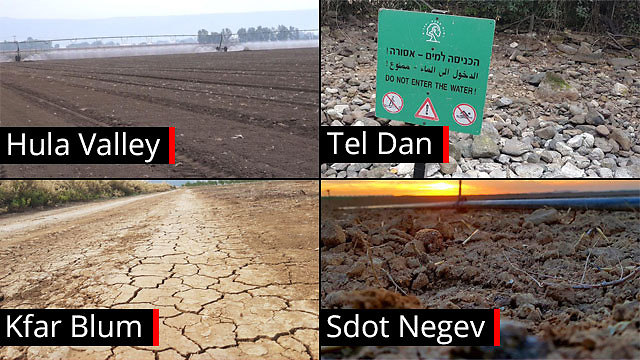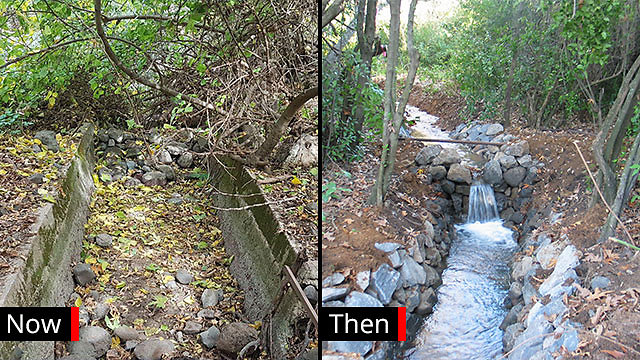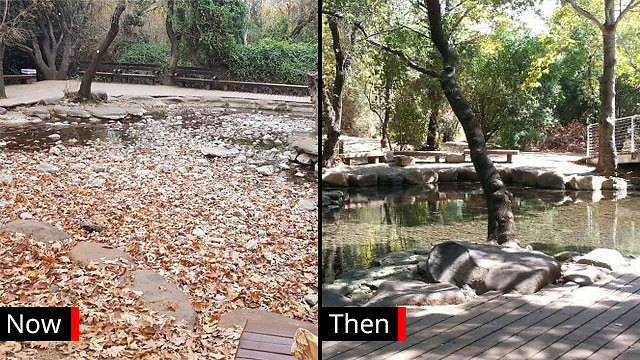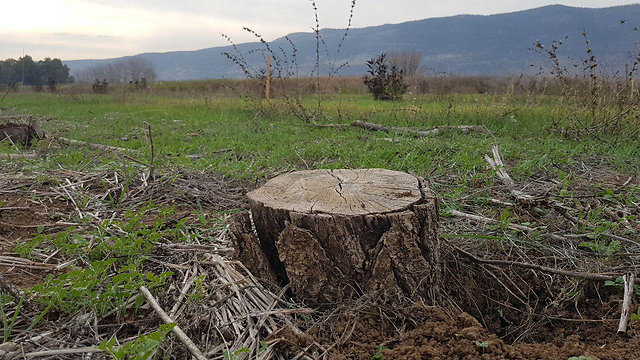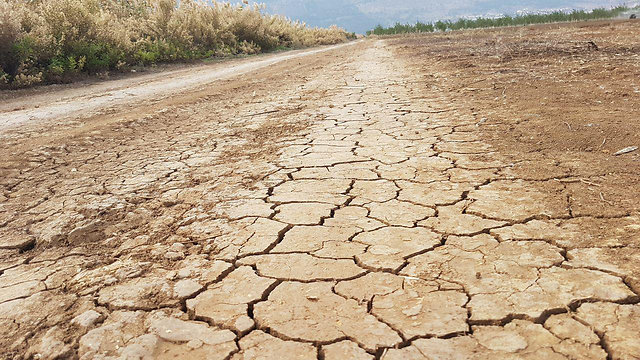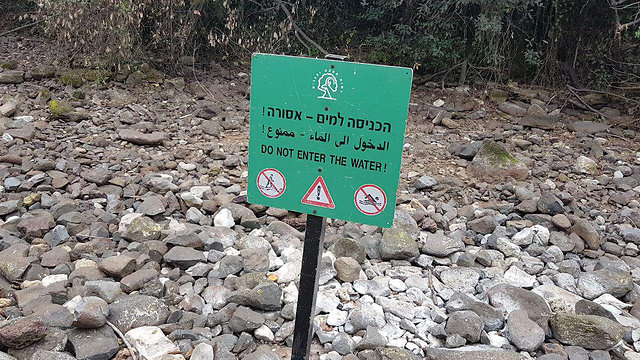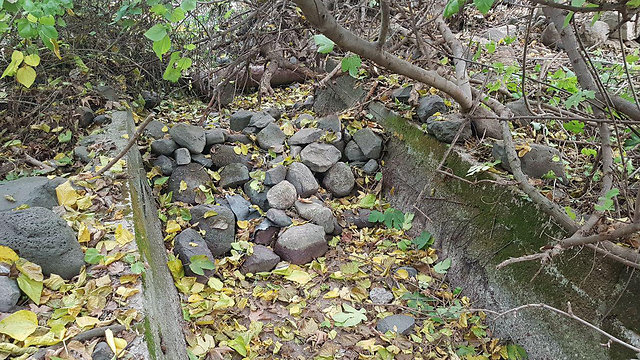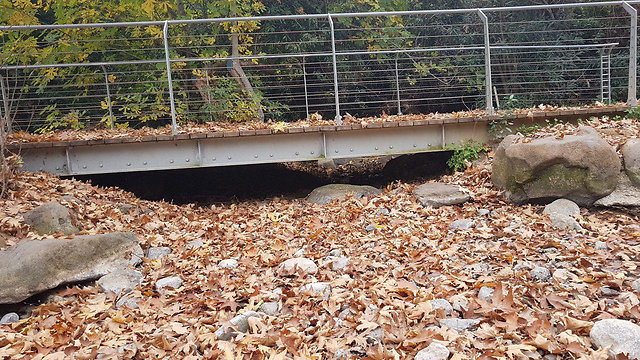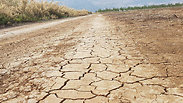
Northern region faces 'worst drought of past 40 years'
Israel's northern region reports fifth year in a row of minute precipitation; farmers have no choice but to water fields already sown but refrain from sowing further; 'I remember the amazing taste of the nectarines we grew here, it was heavenly. But now it has all dried out with just the trunks remaining,' says one farmer.
Israel may be facing the worst drought in the past several decades. Even the Hula Valley, long considered a symbol of Israeli fertility and agriculture, stands yellowing the latter part of December. In fact, the entire surrounding region has dried out, with drought conditions persisting for the past five years harming both nature and people.
The Dan kibbutz's longstanding water man Amikam Dgani toured the upper portion of the Tel Dan nature reserve near the border with Lebanon, an area dotted with springs locals call "Garden of Eden."
Today the famous Tel Dan wading pool has dried out and signs warning against jumping into its waters seem detached from reality. "Due to the extreme drought and groundwater pumping, the 'Garden of Eden' spring has dried out. It's the worst drought I can remember in the past 40 years," Dgani mournfully said.
'A nadir the likes of which has not been seen in years'
Director of the Tel Dan reserve Eitan Nissim of the Israel Nature and Parks Authority was highly perturbed by the upper portion of the reserve drying out. "After five years of drought, the reserve's springs have become more and more arid. The chief spring, which is still flowing with water, has an output significantly low for the season—about half of what we'd expect at wintertime. It's a nadir the likes of which has not been seen in past years," he said.
The fauna was also affected by the drought, Nissim said."Mammals can go down to the springs that are still gushing, but invertebrates in the water and fish are dying out. One of the issues we have to contend with is the survival of the region's rare salamanders. The 'Garden of Eden' is their main habitat and spawning ground in Israel. We funnel some water into the dry wading people to save them," he said.
Groundwater pumping under drought conditions dried up the reserve's upper springs, the official claimed. "We have to find a middle ground between the needs of man, agriculture and tourism and preserving nature, because after it dries up completely we will not be able to restore it," he cautioned.
Going down from Tel Dan to the Hula Valley provides seemingly endless yellow vistas. Director of the Kfar Blum kibbutz's orchards Niv Rosenthal said, "This year we've decided not to sow peas. Due to the drought and high water prices, it's not economically sound."
The kibbutz's longstanding nectarine orchard—whose trees have dried up—was recently uprooted for the same reason. "I remember the amazing taste of the nectarines we grew here, it was heavenly. But now it has all dried out with just the trunks remaining. I feel the state and agriculture minister are not interested in our fate or in the fate of northern agriculture. At this rate and with high irrigation water prices, farming in the Hula Valley will be finished," Rosenthal prophesized.
Director of the Israel Nature and Parks Authority's Golan education center Na'ama Mansfeld shone a light on other troubling phenomena related to the drought. "Due to the severe drought, water flow in the summer months was slow and sparse. Animal and cattle excrement reaching the stream from the Golan Heights remained in the water, causing a dangerous E. coli bacterial outbreak. The Health Ministry forbade visitors from entering the water in the summer.
"We're in the midst of an immense conflict between man and nature—with water squarely at the center of it. It's a process of desertification in the north. This isn't about any one side winning the battle. Nature has a right to water as much as man has the right to agriculture. A solution must be found without delay."
The Israel Meteorological Service published recently its seasonal precipitation forecast for the three main winter months—December, January and February. According to the Service's seasonal model, chances of the aforementioned months being arid are extremely high, estimated at 64.7 percent.
The Meteorological Service further noted that according to the seasonal precipitation forecast, published in November 2017, chances of rainfall being more prevalent than usual were 35.2 percent, chances of the period being "average" were 17.7 percent and chances of little precipitation were 47.1 percent.
Since the seasonal forecast's level of accuracy was low and since opposing scenarios have taken place, the Meteorological Service said, it was hard to reliably estimate the expected volume of winter rainfall.
Responses
The Agriculture Ministry said, "On the issue of water prices, the Agriculture Ministry is the only one who opposed an amendment to the law that caused irrigation water prices to surge in the Hula Valley region. The ministry is working on behalf of farmers and promoting a framework to reimburse them for the price hike. The ministry also supports funneling water to the north using the National Water Carrier's infrastructure, but the Israel Water Authority has the final say."
The aforementioned Water Authority responded, "The Dan springs did not dry out due to pumping. The Dan spring flows forth from the slopes of Mount Hermon and is thus fed off of the mount's precipitation and is not influenced by production. The pumping's effect is substantial only further down the spring's route." The Authority also noted water has already begun to be channeled as far north as the Eshkol site using the National Water Carrier.
On the price of water, the Water Authority said, "The price of freshwater produced independently has been on the rise in the area in order for it to reach the levels of freshwater prices elsewhere in Israel. There had also been a downturn in the rate of freshwater provided by the Mekorot company. The Water Authority and Finance Ministry intend to assist the region to develop water factories to better tackle diminished precipitation. The ball is in farmers' hands now."
The Upper Galilee Regional Council said, "We have reached an important agreement last month with the Water Authority and Finance and Agriculture Ministries, to support Galilean agriculture and help it overcome the crisis caused by water price rises and few precipitation and to help it adjust to the new reality."










